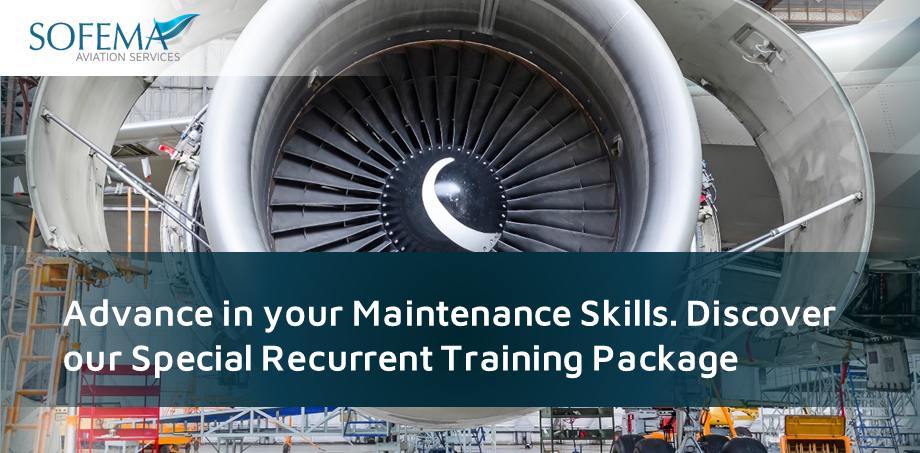We are thrilled to announce the launch of a unique training package tailored specifically for the Aircraft Maintenance Organization (AMO) Staff.
Recurrent Training Package for Aircraft Maintenance Organizations (AMO) Staff – 2 Days
1 Program – 4 Separate Courses – 4 Certificates
In a commitment to elevating the standards of aviation training, Sofema Aviation Services proudly unveils a bespoke training package exclusively crafted for Aircraft Maintenance Organization (AMO) Staff. Recognizing the evolving needs of Aircraft Maintenance Organization (AMO) professionals, this training package is a blend of four meticulously designed courses, ensuring that participants are equipped with the latest knowledge and best practices in the industry.
Courses Included:
Fuel Tank Safety Phase 2 – Recurrent
A critical refresher course on fuel tank safety, ensuring adherence to safety regulations and operational compliance. The course is suitable for aviation professionals who have already completed the initial Fuel Tank Safety training and need to undergo recurrent training to stay updated on the latest regulations and best practices. The recurrent phase of the course aims to reinforce and update the skills learned in initial training, with a focus on new regulatory changes, industry developments, and improvements in fuel tank safety practices.
What are the benefits?
– Strengthen your grasp of fuel tank safety principles in aircraft,
– Keep your knowledge current with the latest regulatory changes.
– Focus on the maintenance, inspection, and repair of fuel systems
Aircraft Fuel Tank Entry Safety Procedures
The course is designed to provide a thorough understanding of Fuel Tank Safety (FTS) Entry Procedures and related issues. Offering a deep dive into the safety procedures for entering aircraft fuel tanks, the training emphasizes the importance of ensuring personnel safety during maintenance and inspection tasks.
What are the benefits?
a) To update the delegate on changes that have taken place since the initial investigations.
b) To review the elements of fuel system safety issues including its language, history, and practical considerations.
c) To equip candidates in their everyday tasks to account for the challenges posed by the Fuel Tank System Safety issues.
d) To consider best practice “in company” procedures to ensure the integrity of the fuel tank safety maintenance processes.
Aircraft FOD Awareness Training Course
Highlighting the significance of FOD awareness, this course trains professionals on the identification, prevention, and management of FOD, a crucial aspect of maintaining aircraft safety and performance.Suitable for any person who is working in the vicinity of aircraft, working on aircraft, or working anywhere where there is potential exposure to Aircraft Parking Bays, Maintenance Areas, Runways, or Taxiways.
What are the benefits?
The participants will gain essential knowledge and skills to recognize, prevent, and mitigate Foreign Object Debris (FOD) hazards on and around aircraft. This course is designed for aviation personnel, ground crew, and maintenance staff to enhance their awareness of FOD risks, improve their FOD detection capabilities, and implement preventive measures to maintain aircraft safety and operational efficiency.
Aircraft Inspection Techniques For CAT A Initial
Targeted at professionals with a background in aviation maintenance, the course is ideal for those involved in quality control, regulatory compliance, or safety management within the aviation industry, the “Aircraft Inspection Techniques For CAT A Initial” course focuses on visual inspection, a key component of Non-Destructive Inspection (NDI) techniques, essential for identifying defects in aircraft components.The purpose of this training is to raise awareness regarding best practices and appropriate considerations when performing a range of maintenance inspections.
What are the benefits?
The purpose of this Course is to provide an overview of best-practice aircraft maintenance inspection techniques
-To further develop an understanding of the need for an effective aircraft maintenance inspection.
-To Provide the Aircraft Inspectors with a basic overview of factors affecting Inspection Performance
-Consider Best Practice Inspection Procedures and the potential for unidentified deterioration
Enjoy Flexible Training Options:
To cater to the varying needs of aviation organizations, Sofema Aviation Services is offering this training package in two convenient formats:
- In-Company Classroom Training: Interactive and engaging sessions conducted by expert instructors, promoting group discussions and experiential learning.Clients can assemble their own program of 4 courses to be delivered over a 2 day program
- Instructor-Led Webinar: For those who prefer remote learning, these courses are also available as webinars, delivering the same high-quality instruction and interactive experience.
Upon successful completion of each course, participants will receive a certificate, accumulating to a total of four individual certificates for the complete package.
About Sofema Aviation Services:
With a legacy of delivering unparalleled aviation training solutions to professionals globally, Sofema Aviation Services continues to be the preferred choice for many in the aviation sector. Committed to excellence and fostering continuous learning, Sofema is dedicated to elevating the standards of aviation training.
Enrollment and Contact Information:
For more details on this training package or to register, please visit the website of Sofema Aviation Services or reach out to our dedicated team at team@sassofia.com.
Tags:
Fuel Tank Safety Phase 2 – Recurrent, key component, Taxiways, Runways, Maintenance Areas, Aircraft Parking Bays, In-Company Classroom Training, Aircraft FOD Awareness Training Course, Aircraft Fuel Tank Entry Safety Procedures, Recurrent Training Package, Aviation Maintenance, instructor-led webinar, Non-destructive Inspection (NDI), Aircraft Maintenance Organization (AMO), Aircraft components, Regulatory Compliance, Quality Control, Aviation Industry, Safety Management, Fuel Tank Safety





